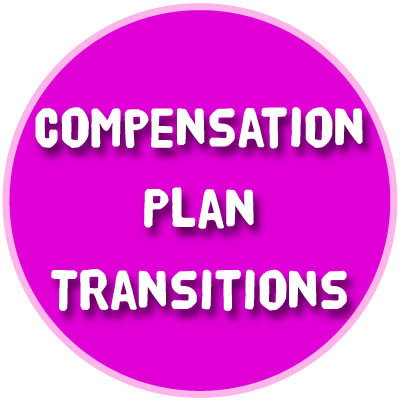 Compensation plans are important. They motivate and reward specific behaviors. But what if your compensation plan isn’t doing well enough? How do you transition from one compensation plan to another?
Compensation plans are important. They motivate and reward specific behaviors. But what if your compensation plan isn’t doing well enough? How do you transition from one compensation plan to another?
The short answer is “carefully” but you need to know more than a one-word answer. In this post, you’ll learn what matters most and what you can do to minimize the negative effects of this change.
Winners and Losers
Unless you plan to pay out more in your new compensation plan, there will be winners and losers when you implement your new plan. Winners will earn more, while losers will earn less. Everyone likes to learn more money, but few of us accept pay cuts without complaint.
In advance of implementing or even announcing a new compensation plan, you will need to know not just who will be the winners and who will be the losers with your new plan, but also the magnitude of gain or loss.
With this knowledge, you can make good decisions on not only how you will present the new compensation plan, but also how you will transition to it and how you will respond proactively to the losers.
Transparency
Whether you change your compensation plan a bit or implement a completely new one, you will have your reasons. Ultimately, your goal is probably to increase the growth rate for your company or perhaps improve your profitability. To achieve your corporate goals, your sales force will need to produce more and therefore earn more.
So, compensation plan changes should be presented with a focus on what is best for the field because this is important for everyone, your company included. Be sure to explain the purpose of each of your compensation plan’s bonuses so that your sales force will understand your intentions and their rewards.
Introduction
You definitely don’t want your compensation plan to be labeled by your field as “bad news.” So, how do you prevent this situation?
The first step is to share your new compensation plan with your top leaders. They will feel valued when you show it to them first. When you ask them how they feel about the plan, they will tell you and sometimes this information will help you in explaining the plan to others.
The second group of representatives with whom you should share the upcoming compensation plan is the rest of your leaders. Only after you’ve done this should you release the details to everyone else.
Damage Control
One of the goals of your new compensation plan should be for your most productive representatives to experience higher incomes and to do so as quickly as possible after the effective date of your new plan.
However, it’s important to realize in the short term after announcing or implementing your new compensation plan, you may see drops in sales and recruiting. This is normal because, in response to change, some independent representatives will decide not to place their next order, wait before selling to others, delay recruiting others, or quit.
To counter this possibility, it’s wise to consider starting a contest, introducing new products, offering customer incentives, and other measures to motivate sales and recruiting at the same time the new compensation plan goes live.
Your Transition Plan
Transitioning to a new or improved compensation plan can be a risky endeavor. Like a heart transplant, it’s important to keep the patient alive both during and after the procedure.
For help in transitioning your compensation plan, consult with the experts at Sylvina Consulting.

 Jay Leisner, the President of Sylvina Consulting, is a top compensation plan and direct selling expert, a trusted adviser to new and established network marketing and party plan companies. For more than 30 years, Jay has enjoyed assessing and improving network marketing, party plan and referral marketing companies across the globe.
Jay Leisner, the President of Sylvina Consulting, is a top compensation plan and direct selling expert, a trusted adviser to new and established network marketing and party plan companies. For more than 30 years, Jay has enjoyed assessing and improving network marketing, party plan and referral marketing companies across the globe.
Leave a Reply